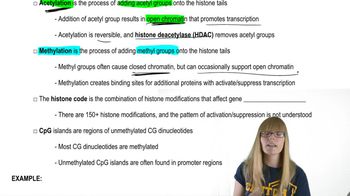Define and describe the differences in the primary, secondary, and tertiary structures of a protein.
Table of contents
- 1. Introduction to Genetics51m
- 2. Mendel's Laws of Inheritance3h 37m
- 3. Extensions to Mendelian Inheritance2h 41m
- 4. Genetic Mapping and Linkage2h 28m
- 5. Genetics of Bacteria and Viruses1h 21m
- 6. Chromosomal Variation1h 48m
- 7. DNA and Chromosome Structure56m
- 8. DNA Replication1h 10m
- 9. Mitosis and Meiosis1h 34m
- 10. Transcription1h 0m
- 11. Translation58m
- 12. Gene Regulation in Prokaryotes1h 19m
- 13. Gene Regulation in Eukaryotes44m
- 14. Genetic Control of Development44m
- 15. Genomes and Genomics1h 50m
- 16. Transposable Elements47m
- 17. Mutation, Repair, and Recombination1h 6m
- 18. Molecular Genetic Tools19m
- 19. Cancer Genetics29m
- 20. Quantitative Genetics1h 26m
- 21. Population Genetics50m
- 22. Evolutionary Genetics29m
11. Translation
Proteins
Problem 22
Textbook Question
HbS results in anemia and resistance to malaria, whereas in those with HbA, the parasite Plasmodium falciparum is able to invade red blood cells and cause malaria. Predict whether those with HbC are likely to be anemic and whether they would be resistant to malaria.
 Verified step by step guidance
Verified step by step guidance1
Understand the genetic basis of the problem: HbS, HbA, and HbC are alleles of the hemoglobin gene. HbS is associated with sickle cell anemia and malaria resistance, while HbA is the normal allele that allows susceptibility to malaria. HbC is another variant of the hemoglobin gene, and its effects need to be analyzed in this context.
Review the molecular and physiological effects of HbC: Research has shown that individuals with the HbC allele produce hemoglobin with a slightly altered structure. This alteration does not cause sickling of red blood cells like HbS, but it may affect the ability of Plasmodium falciparum to invade red blood cells.
Analyze the likelihood of anemia in individuals with HbC: Since HbC does not cause sickling of red blood cells, individuals with the HbC allele are less likely to experience the severe anemia associated with HbS. However, some mild effects on red blood cell function may still occur.
Evaluate malaria resistance in individuals with HbC: Studies suggest that the HbC allele provides some level of resistance to malaria, though not as strong as the resistance seen in individuals with the HbS allele. This resistance is likely due to the altered red blood cell environment, which makes it harder for Plasmodium falciparum to thrive.
Conclude the predictions: Based on the above analysis, individuals with HbC are less likely to be anemic compared to those with HbS, and they are likely to have some resistance to malaria, though not as strong as that conferred by HbS.
 Verified video answer for a similar problem:
Verified video answer for a similar problem:This video solution was recommended by our tutors as helpful for the problem above
Video duration:
2mPlay a video:
Was this helpful?
Key Concepts
Here are the essential concepts you must grasp in order to answer the question correctly.
Sickle Cell Trait and Malaria Resistance
Individuals with the HbS variant of hemoglobin have a mutation that causes sickle-shaped red blood cells, which are less hospitable to the malaria parasite Plasmodium falciparum. This trait provides a selective advantage in malaria-endemic regions, as it reduces the severity of malaria infections, leading to increased survival rates among carriers.
Recommended video:
Guided course

Traits and Variance
Hemoglobin Variants
Hemoglobin variants, such as HbA, HbS, and HbC, are different forms of hemoglobin that arise from mutations in the HBB gene. HbA is the normal form, while HbC is another variant that can affect red blood cell shape and function, potentially influencing susceptibility to anemia and malaria.
Recommended video:
Guided course

Histone Protein Modifications
Anemia and Its Causes
Anemia is a condition characterized by a deficiency in red blood cells or hemoglobin, leading to reduced oxygen transport in the body. It can result from various factors, including genetic disorders like sickle cell disease or HbC, nutritional deficiencies, or chronic diseases, impacting overall health and resistance to infections.
Recommended video:
Guided course

Cancer Causes
Related Videos
Related Practice
Textbook Question
481
views


